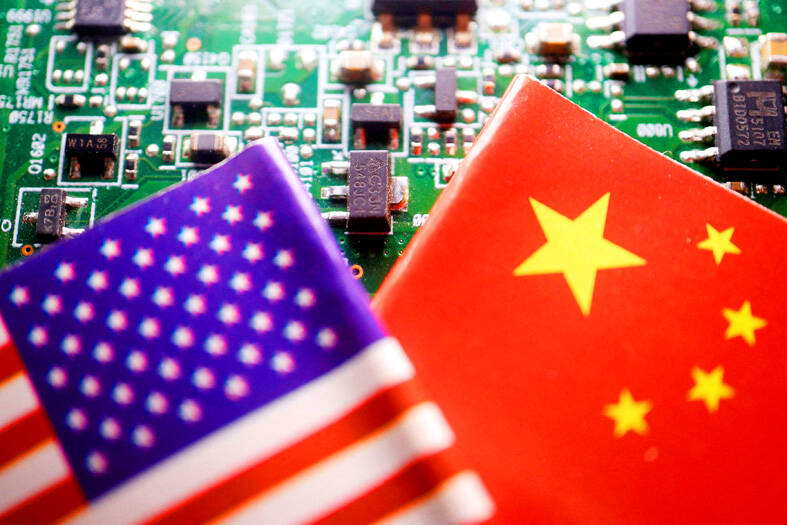Semiconductor shares in China surged yesterday after Reuters reported the US had ordered chipmaking giant Taiwan Semiconductor Manufacturing Co (TSMC, 台積電) to halt shipments of advanced chips to Chinese customers, which investors believe could accelerate Beijing’s self-reliance efforts.
TSMC yesterday started to suspend shipments of certain sophisticated chips to some Chinese clients after receiving a letter from the US Department of Commerce imposing export restrictions on those products, Reuters reported on Sunday, citing an unnamed source.
The US imposed export restrictions on TSMC’s 7-nanometer or more advanced designs, Reuters reported.

Photo: Reuters
Investors figured that would encourage authorities to support China’s industry and bought shares in local makers, sending Semiconductor Manufacturing International Corp (SMIC, 中芯國際) stock up 4.7 percent to a record high.
SMIC is China’s largest foundry and the country’s main alternative to TSMC. It is known for helping Huawei Technologies Co (華為) produce chips used in its latest smartphones, including the Mate 60 and Pura 70.
The CSI Semiconductor Index jumped more than 6 percent during trading to hit a three-year high, while the CSI Integrated Circuits Index rose 5 percent. Information technology shares advanced 4.8 percent to their highest level in two-and-a-half years.
“In the medium and long term, it will force the reorganization of the supply chain, increase the demand for domestic advanced process production capacity, and promote technological breakthroughs in upstream semiconductor equipment and materials,” Chinese brokerage Cinda Securities Co (信達證券) said in a note on Sunday.
Investors have bet that the re-election of Donald Trump as US president could actually benefit strategic sectors in China by drawing state backing and say China is much better prepared for trade tensions than in 2016.
In Taipei trading, TSMC recovered most of its early losses thanks to its sound fundamentals, closing 0.46 percent lower at NT$1,085 after hitting NT$1,070.
TSMC shares were under pressure following Reuters’ report, Cathay Futures Consultant Co (國泰證期顧問) analyst Tsai Ming-han (蔡明翰) said.
“TSMC remains fundamentally healthy, so the earlier losses provided a good opportunity for bargain hunters to buy,” Tsai said, referring to the company’s record high sales of NT$314.24 billion last month, up 29.2 percent from a year earlier.
“To my knowledge, TSMC stopped selling chips made on the 7-nanometer process to China before the report surfaced. The report only had a short-lived impact on TSMC’s share price today,” Tsai said.
Additional reporting by CNA and staff writer

POWERING UP: PSUs for AI servers made up about 50% of Delta’s total server PSU revenue during the first three quarters of last year, the company said Power supply and electronic components maker Delta Electronics Inc (台達電) reported record-high revenue of NT$161.61 billion (US$5.11 billion) for last quarter and said it remains positive about this quarter. Last quarter’s figure was up 7.6 percent from the previous quarter and 41.51 percent higher than a year earlier, and largely in line with Yuanta Securities Investment Consulting Co’s (元大投顧) forecast of NT$160 billion. Delta’s annual revenue last year rose 31.76 percent year-on-year to NT$554.89 billion, also a record high for the company. Its strong performance reflected continued demand for high-performance power solutions and advanced liquid-cooling products used in artificial intelligence (AI) data centers,

SIZE MATTERS: TSMC started phasing out 8-inch wafer production last year, while Samsung is more aggressively retiring 8-inch capacity, TrendForce said Chipmakers are expected to raise prices of 8-inch wafers by up to 20 percent this year on concern over supply constraints as major contract chipmakers Taiwan Semiconductor Manufacturing Co (TSMC, 台積電) and Samsung Electronics Co gradually retire less advanced wafer capacity, TrendForce Corp (集邦科技) said yesterday. It is the first significant across-the-board price hike since a global semiconductor correction in 2023, the Taipei-based market researcher said in a report. Global 8-inch wafer capacity slid 0.3 percent year-on-year last year, although 8-inch wafer prices still hovered at relatively stable levels throughout the year, TrendForce said. The downward trend is expected to continue this year,

A proposed billionaires’ tax in California has ignited a political uproar in Silicon Valley, with tech titans threatening to leave the state while California Governor Gavin Newsom of the Democratic Party maneuvers to defeat a levy that he fears would lead to an exodus of wealth. A technology mecca, California has more billionaires than any other US state — a few hundred, by some estimates. About half its personal income tax revenue, a financial backbone in the nearly US$350 billion budget, comes from the top 1 percent of earners. A large healthcare union is attempting to place a proposal before

Vincent Wei led fellow Singaporean farmers around an empty Malaysian plot, laying out plans for a greenhouse and rows of leafy vegetables. What he pitched was not just space for crops, but a lifeline for growers struggling to make ends meet in a city-state with high prices and little vacant land. The future agriculture hub is part of a joint special economic zone launched last year by the two neighbors, expected to cost US$123 million and produce 10,000 tonnes of fresh produce annually. It is attracting Singaporean farmers with promises of cheaper land, labor and energy just over the border.